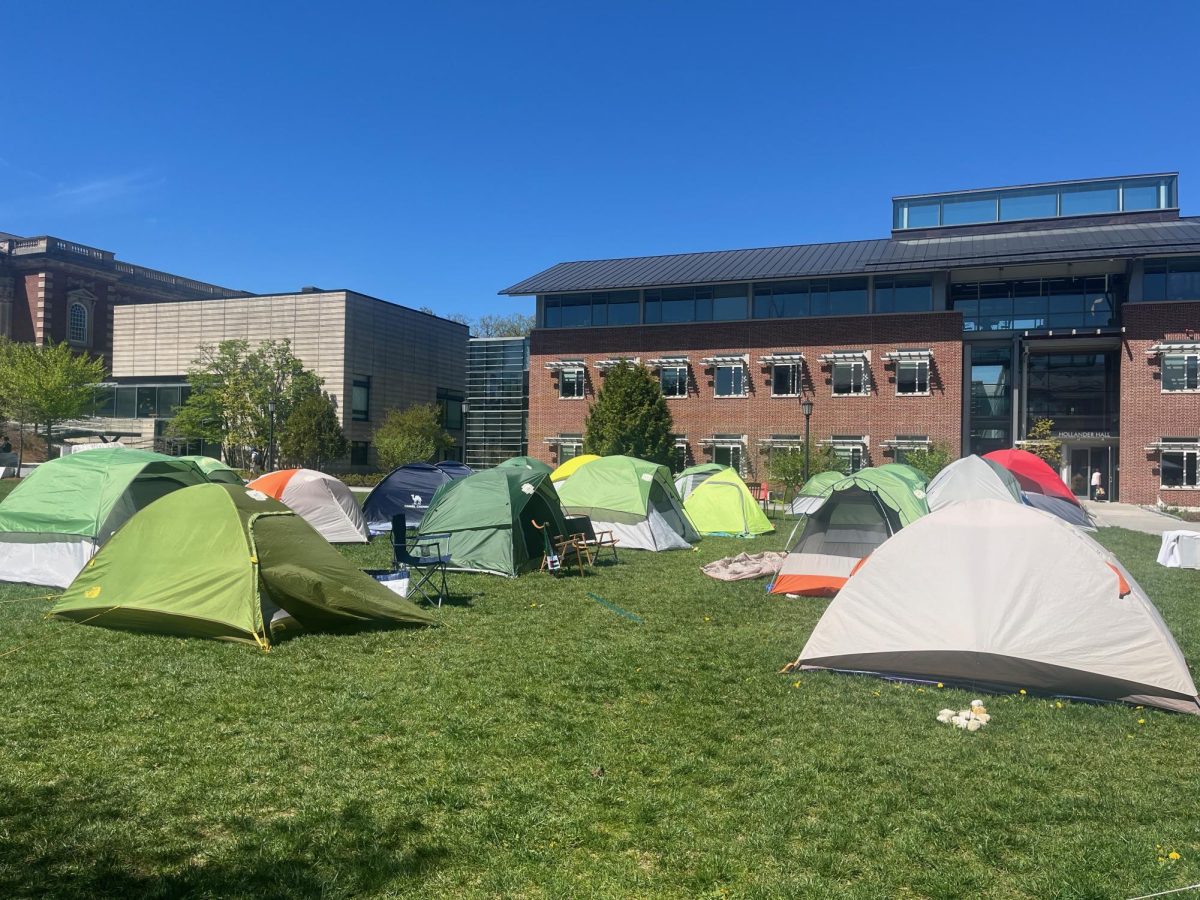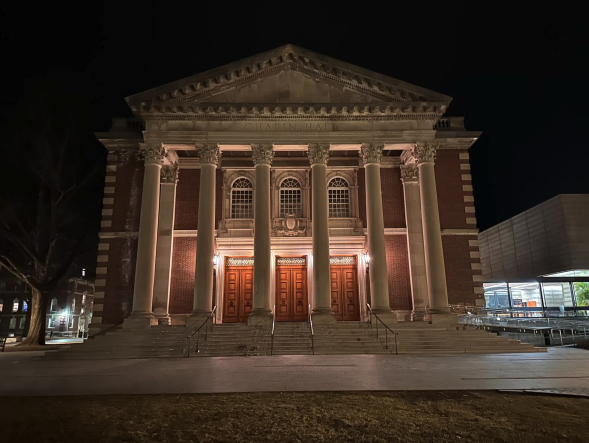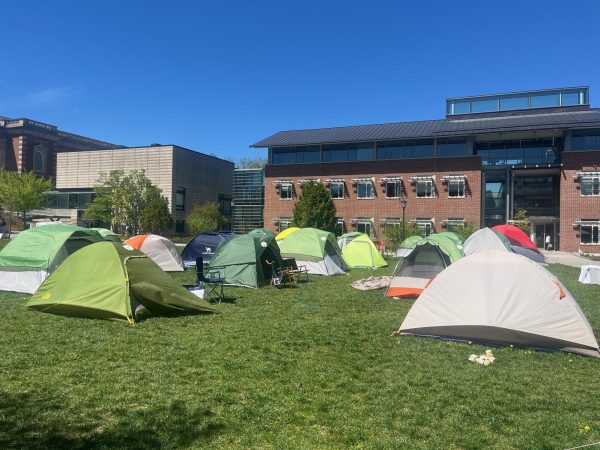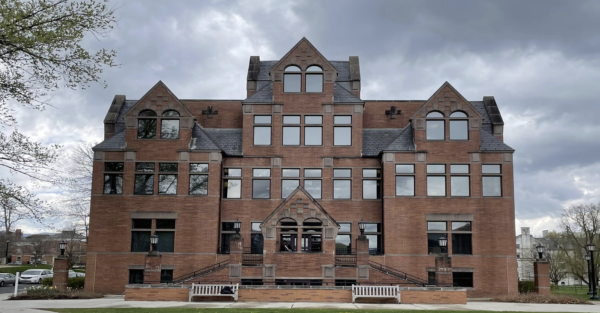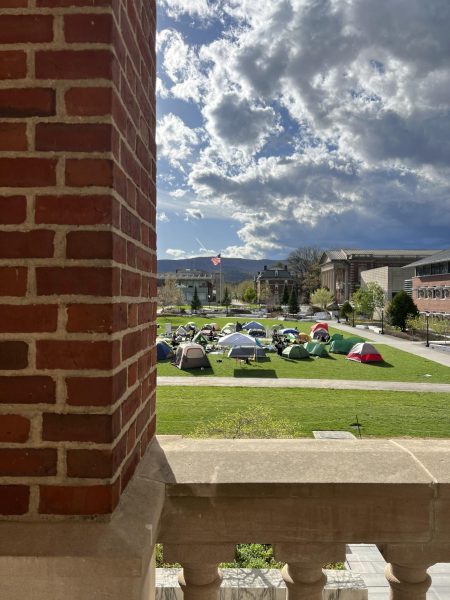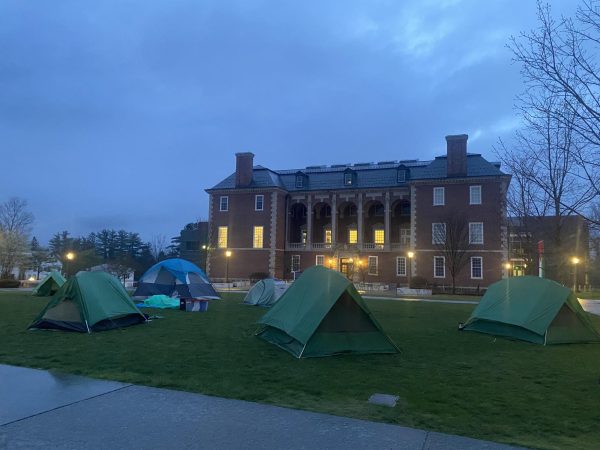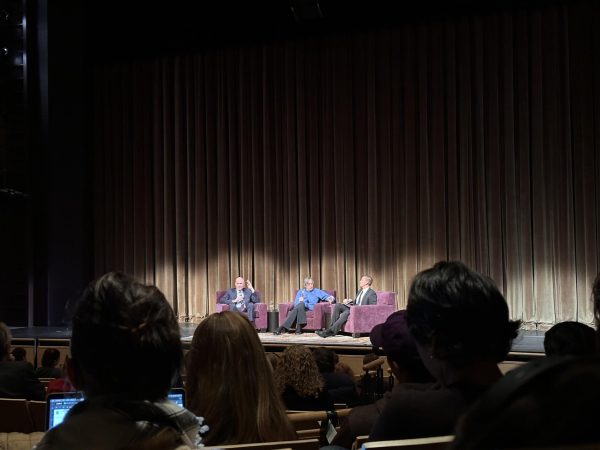Record survey reveals split student opinion on College’s COVID policies
September 21, 2022
Student opinions of the College’s COVID-19 policies are divided, a Record survey found. Nearly a third of students expressed neutrality about the College’s protocols, while the remainder were almost evenly split between approval and disapproval, slightly weighted towards the former. Survey responses were also divided on whether the College should escalate its COVID protocols to include mandatory weekly testing and an additional booster shot that would protect against Omicron variants. As of Sept. 17, 12.2 percent of respondents reported having contracted COVID while on campus this semester.
The survey, which was conducted last week, was sent to 500 Record survey reveals split student opinion on College’s COVID policies randomly selected unixes and received 254 responses — from 84 first-years, 66 sophomores, 33 juniors, and 71 seniors — for a response rate of 50.8 percent. Off-cycle students were asked to round up their class years.
On a scale from one to five, with one corresponding to “strongly disapprove” and five to “strongly approve” of the College’s current COVID policies, 32.3 percent of respondents disapproved (choosing a one or two), while 29.9 percent were neutral (three) and 37.8 percent approved (four or five).
A vast majority of respondents chose one of the middle three options, with only 7.5 percent indicating strong disapproval and 8.7 percent strong approval.
Approval of the College’s COVID policies differed significantly across class years. While overall net approval was +5.5 percent, seniors provided by far the most unfavorable ratings at -24 percent, and first-years were the most approving at +36.9 percent. Sophomores and juniors fell in between, at -4.6 percent and +9 percent, respectively.
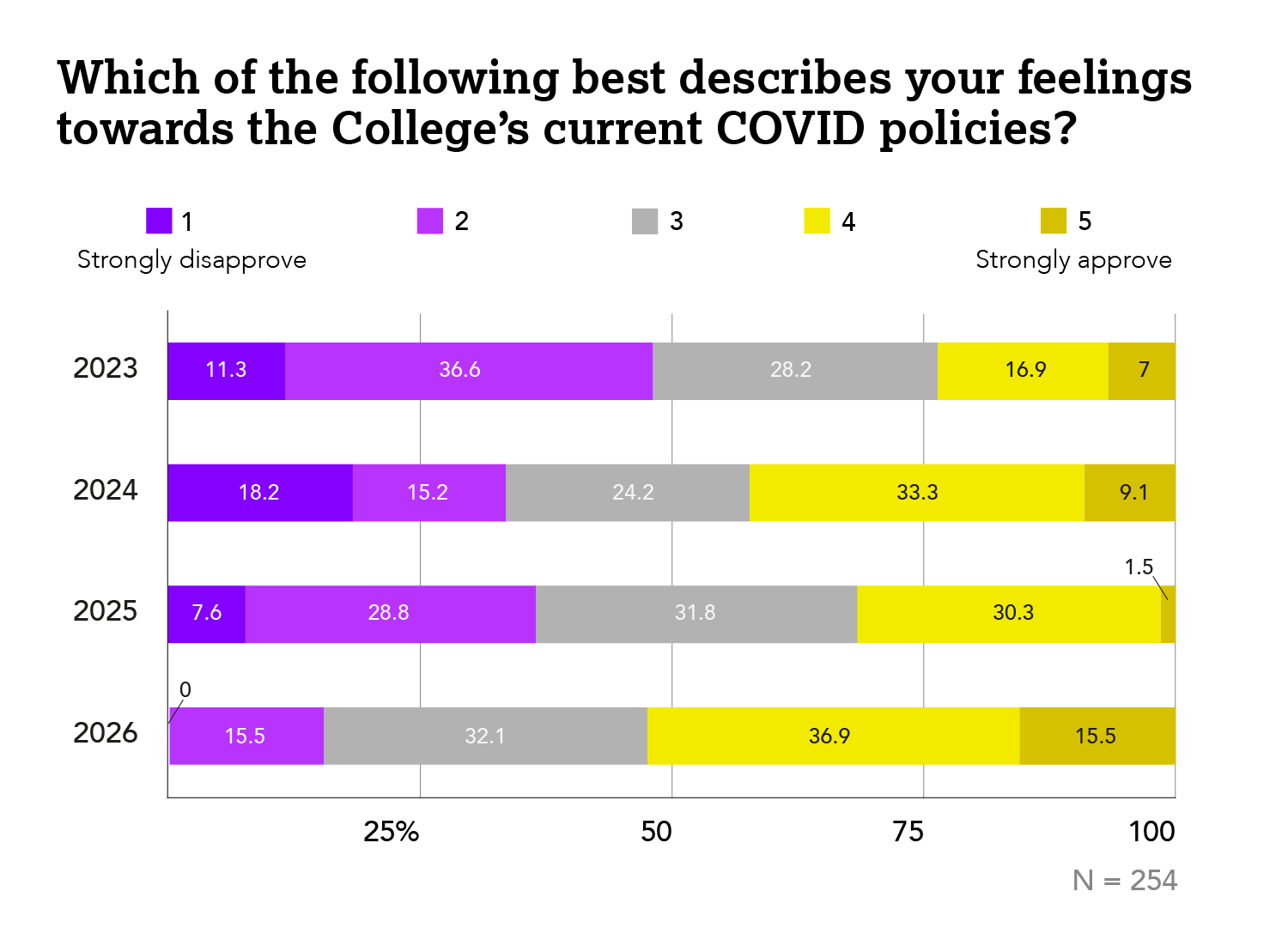
On the contrary, approval ratings did not vary as significantly between students who had contracted COVID since arriving on campus this semester and those who had not. Students who have had COVID expressed a slight net disapproval of -3.2 percent, while those who had not reported a net approval of +10.8 percent.
The survey also asked respondents to indicate how important of a concern they thought the pandemic was at this time “to you” versus “to the College,” revealing a mismatch between perceptions of the two. While 38.2 percent said the pandemic was “not important” to themselves, only 27.2 percent felt that it was “not important” to the College. Likewise, only 16.1 percent said the pandemic was “very important” to themselves, while 21.7 percent perceived it as “very important” to the College.
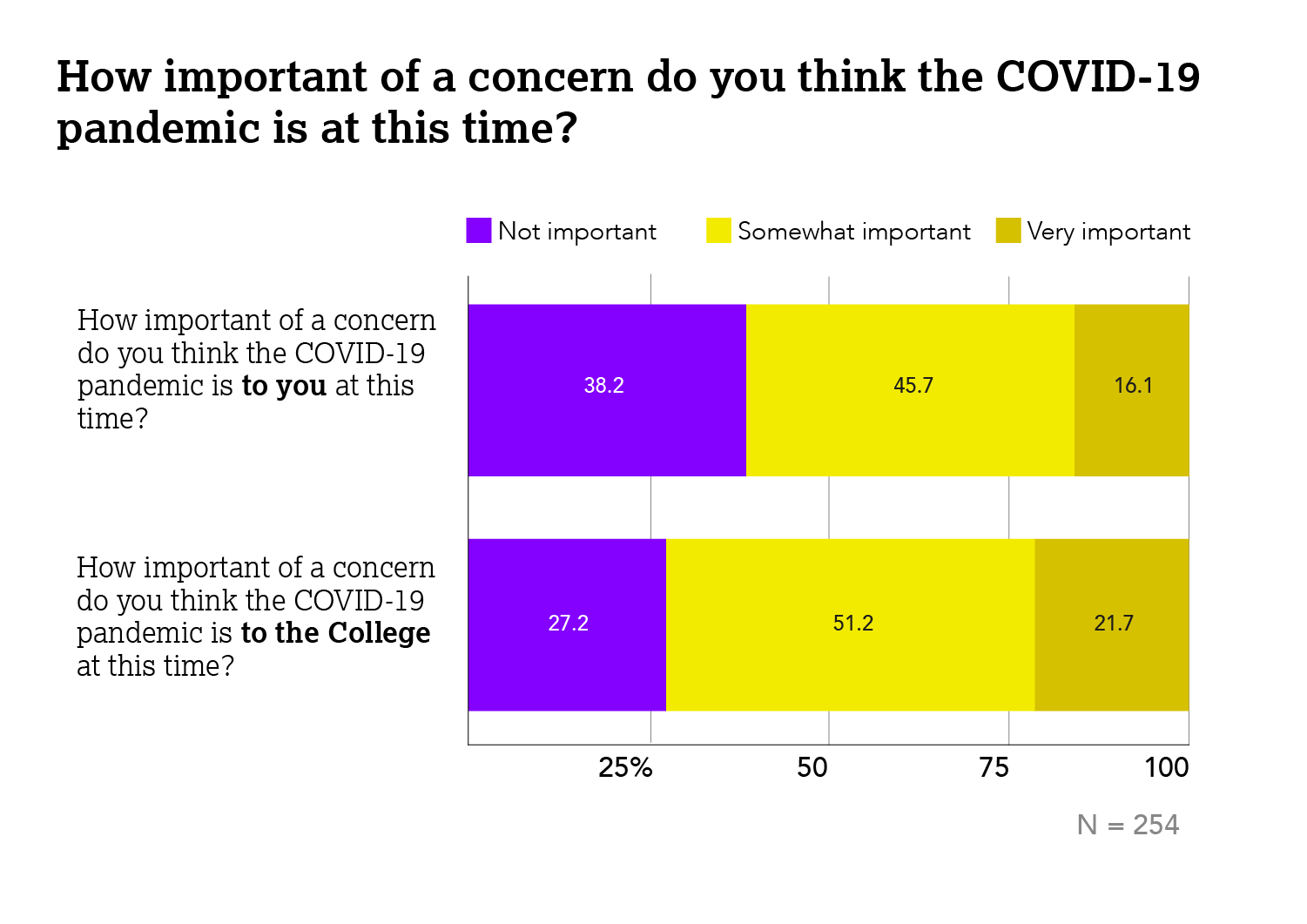
How a respondent rated the importance of the pandemic to themself varied significantly by pronouns. While 51.2 percent of those who indicated he/him pronouns rated the pandemic as “not important,” only 25.4 percent of respondents identifying as she/ her said the same. A majority of respondents who use she/her pronouns rated the pandemic as “somewhat important” to them.
“The College as an institution has people that are more affected by the pandemic than I am personally,” Aracely Watson ’25 said, explaining why she believed the College perceives the pandemic as a more important concern than she does.
“For me, [COVID] presented as a really strong cold, but I got over it, whereas the College has to think about all of the students and faculty and families that potentially don’t have as strong of an immune system,” Watson continued. “I think it’s good that the College puts it as a priority, because not everybody has the opportunity to be equal in their immunity.”
Watson noted that some students on campus might be immunocompromised, and faculty and staff might go home to immunocompromised family members or children too young to be vaccinated against the virus. “Everyone’s just in a different place, so the College has to be as conservative as possible in order to keep everybody safe,” she said.
Eight percent of survey respondents indicated that they have pre-existing conditions that put them at higher risk of developing complications from COVID.
Of the survey respondents 12.2 percent reported having contracted COVID (and verified the result via a test) since arriving on campus, and 54.3 percent said they had been a close contact of someone with COVID since coming to campus.
The survey also asked respondents how many rapid tests they had taken since arriving on campus. In an Aug. 5 email, Chief Communications Officer Jim Reische wrote that students traveling back to campus “need to take an antigen test before departure and two more after arrival.” The College also mandates antigen testing for symptomatic people, although there is no mechanism to enforce this.
Despite this requirement, only 76.6 percent of respondents to the survey said they had taken one or more rapid tests since arriving on campus: 61.4 percent had taken between one and three tests, 14.6 percent had taken between four and six, and 1.6 percent had taken seven or more. The remaining 22.4 percent reported having taken zero rapid tests.
Student opinion was split over whether the College should require any level of weekly testing. While 47.6 percent would prefer no weekly testing at all, 15 percent expressed a desire for weekly PCR testing only, and 24.8 percent for weekly antigen testing only (with the remainder having no preference).
Whether the College should require the recently authorized Omicron-specific booster was also divisive: 50.8 percent of respondents said it should be mandated, while 29.1 percent said it should not.
Masking requirements elicited slightly more agreement amongst the student body, with 59.1 percent saying the College should not require masking in libraries and academic and administrative buildings, and only 27.2 percent saying it should.
“Because the College hasn’t implemented a mask mandate in the gym or the library or in classes, it’s still up to the professor, and I tend to agree with those policies,” Craig Martien ’23 said. He raised a concern that only requiring masks in a limited number of settings would not be effective at preventing the spread of COVID. “I fail to see how people wearing a mask in their classroom, or in the library … or when they’re in the gym … and testing on a weekly basis is going to discourage superspreader events from happening over the weekends on Hoxsey Street, or from people going to sports games and spreading the virus that way,” he continued.
While Laurel Swanson ’23 agreed that a mask mandate would likely not be an effective solution, given that “people wouldn’t follow it,” she reminisced about the stronger policies the College implemented last year. “I felt like last year was a good balance,” Swanson said.
“I felt like we managed spikes in cases with the testing program pretty well. This year feels very lax compared to past years — it just feels like we’re kind of ignoring it at this point, which is strange given how much COVID there is everywhere.”
Swanson said what she wanted most was more resources to be able to make decisions for herself, including better access to rapid tests and masks. “I should be able to get tests even though I’m asymptomatic because I have been exposed, but the mailroom only gives them to symptomatic people,” she said.
In an email to the Record, Reische wrote that the College-provided rapid tests are meant to be used for “weekly asymptomatic testing, symptomatic testing, and testing out of isolation.” He stressed that while the College has enough tests for intended uses, some students have been using rapid tests in ways that are ineffective and deplete stocks too quickly.
“Staff had to start asking about symptoms because students were requesting kits for daily asymptomatic testing, or to use multiple times per day,” he wrote. “Those unintended [and ineffective] uses were quickly eating into the supply we provided for everyone.”
Information from the College was another resource that Swanson initially felt was lacking. Although the College has requested that people report positive tests through an online form that was sent campuswide, it did not start announcing case counts until Sept. 19. According to an all-campus email from Reische on that day, case counts will now be shared in the regular Campus Operations and Business Continuity Updates.
Publishing the number of recent COVID cases on campus was the action that received the most student support in the survey: 65.4 percent of respondents said they would prefer for the College to provide this information, while only 17.7 percent said they would not.
Stone Murphy ’26, who is a recent transfer student, said that the College’s COVID policies are much more effective than the ones at his previous school — a difference he credits, in large part, to the College’s vast resources.
“At my last school, there were a lot of administrative decisions that seemed to contradict what was in the best interest of public health,” he said. “[From] what I’ve seen so far, at Williams … It seems like it’s an important issue to [the faculty] to make sure that students feel safe and comfortable, and that public health is put at the forefront of things.”
Murphy said that the College community must strike a balance between living with COVID — recognizing that the Omicron strain and its subvariants are less deadly than their predecessors — while ensuring that vulnerable community members are safe.
“The virus in the fall of 2022 is something entirely different than it was in March of 2020,” Murphy said.
“I think we took it for granted that it was just going to be something that we’re dealing with, but we’re also taking it for granted that for 99 percent of the community, it’s like a cold or a flu at this point,” he continued. “But that’s not everyone, and that’s the biggest thing. We need to have that ‘no-man left behind’ mentality with COVID.”






